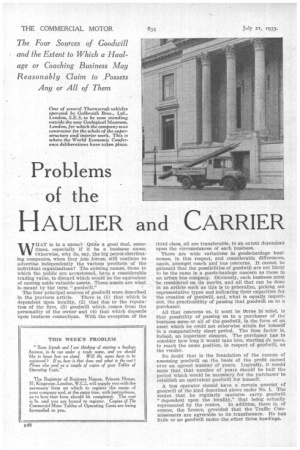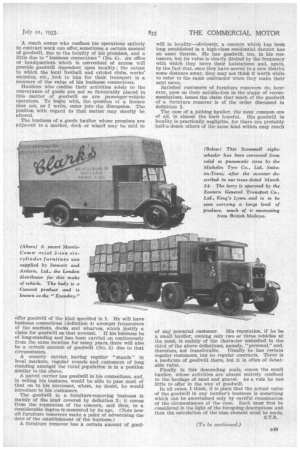Problems of the
Page 62

Page 63

If you've noticed an error in this article please click here to report it so we can fix it.
HAULIER and CARRIER
The Four Sources of Goodwill and the Extent to Which a Haulage or Coaching Business May Reasonably Claim to Possess Any or All of Them
WHAT is in a name? Quite a good deal, sometimes, especially if it be a business name. Otherwise, why do, say, the big petrol-distributing companies, when they join forces, still continue to advertise independently the various products of the individual organizations? The existing names, those to which the public are accustomed, have a considerable trading value, to discard which would be the equivalent of casting aside valuable assets. Those assets are what is meant by the term "goodwill."
The four principal sources of goodwill were described In the previous article. There is (1) that which is dependent upon locality, (2) that due to the reputation of the firm, (3) goodwill which comes from the personality of the owner and (4) that which depends upon business connections. With the exception of the
third class, all are transferable, to an extent dependent upon the circumstances of each business.
There are wide variations in goods-haulage businesses, in this respect, and considerable differences, again, amongst coach and bus concerns. It cannot be gainsaid that the possibilities of goodwill are not likely to be the same in a goods-haulage concern as those in an urban bus company. Obviously, each business must be considered on its merits, and all that can be done in an article such as this is to generalize, picking out representative types and indicating their capacities for the creation of goodwill, and, what is equally important, the practicability of passing that goodwill on to a purchaser.
All that concerns us, it must be borne in mind, is that possibility of passing on to a purchaser of the business some or all of the goodwill, in the form of an asset which he could not otherwise attain for himself in a comparatively short period. The time factor is, Indeed, an important element. The purchaser has to consider how long it would take him, starting de novo, to reach the same position, in respect of goodwill, as the vendor.
No doubt that is the foundation of the custom of assessing goodwill on the basis of the profit earned over an agreed number of years. Logically, it would seem that that number of years should be half the period which would be necessary for the purchaser to establish an equivalent goodwill for himself.
A bus operator should have a certain amount of goodwill of the kind described above under No. 1. The routes that he regularly operates carry goodwill "dependent upon the locality," that being actually represented by the routes. In addition, there is, of course, the licence, provided that the Traffic Commissioners are agreeable to its transference. He has little or no goodwill under the other three headings. A coach owner who confines his operations entirely 0 contiact work can offer, sometimes, a certain amount of goodwill, due to the locality of his premises, and a little due to "business connections" (No. 4). An office or headquarters which is convenient of access will provide goodwill dependent upon locality ; the extent to which the local football and cricket clubs, works' societies, etc., look to him for their transport is a measure of the value of his business connections.
Hauliers who confine their activities solely to the conveyance of goods are not so favourably placed in this matter of goodwill as are passenger-vehicle operators. To begin with, the question ol a licence does not, as I write, enter into the discussion. The position with regard to that matter may shortly be altered.
The business of a goods haulier whose premises are adjacent to a market, dock or wharf may be said to offer goodwill of the kind specified in 1. He will have business connections (definition 4) amongst frequenters of the markets, docks and wharves, which justify a claim for goodwill on that account. If his business be of long-standing and has been carried on continuously from the same location for many years, there will also be a certain amount of goodwill (No. 2) due to that circumstance.
A country carrier, having regular "stands" in local markets, regular rounds and customers of long standing amongst the rural population is in a position similar to the above.
A parcel carrier has goodwill in his connections, and, in selling his business, would be able to pass most of that on to his successor, whom, no doubt, he would introduce to his customers.
The goodwill in a furniture-removing business is mainly of the kind covered by definition 2; it comes from the reputation of the concern, and thus, to a Considerable degree is measured by its age. (Note how all furniture removers make a point of advertising the dale of the establishment of the business.)
A. furniture remover has a certain amount of good
will in locality—obviously, a concern which has been long established in a high-class residential district has an asset therein. He has goodwill, too, in his customers, but its value is clearly limited by the frequency with which they move their habitations and, again, by the fact that, once they have moved to a new district some distance away, they may not think it worth while to refer to the same contractor when they make their next move.
Satisfied customers of furniture removers do, however, pass on their satisfaction in the shape of recommendations, hence the claim that much of the goodwill of a furniture remover is of the order discussed in definition 2.
The case of a jobbing haulier, the most common one of all, 'is almost the least hopeful. His goodwill in locality is practically negligible, for there are probably half-a-dozen others of the same kind within easy reach of any potential customer. His reputation, if he be a small haulier, owning only two or three vehicles at the most, is mainly of the character embodied in the third of the above definitions, namely, "personal," and, therefore, not transferable. Usually he has certain regular customers, but no regular contracts. There is a modicum of goodwill there, but it is often of debatable value.
Finally in this descending scale, comes the small haulier, whose activities are almost entirely confined to the haulage of sand and gravel. As a rule he has little to offer in the way of goodwill.
In all cases, I think, it is plain that the actual value of the goodwill in any haulier's business is something which can be ascertained only by careful examination of the circumstances of the case. Each must first be considered in the light of the foregoing descriptions and then the calculation of the time element must be made.
S.T.R.




























































































